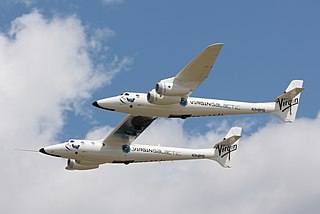
A spaceplane is a vehicle that can fly and glide like an aircraft in Earth's atmosphere and maneuver like a spacecraft in outer space. To do so, spaceplanes must incorporate features of both aircraft and spacecraft. Orbital spaceplanes tend to be more similar to conventional spacecraft, while sub-orbital spaceplanes tend to be more similar to fixed-wing aircraft. All spaceplanes to date have been rocket-powered for takeoff and climb, but have then landed as unpowered gliders.

Private spaceflight refers to spaceflight activities undertaken by non-governmental entities, such as corporations, individuals, or non-profit organizations. This contrasts with public spaceflight, which is traditionally conducted by government agencies like NASA, ESA, or JAXA.

Virgin Galactic Holdings, Inc. is a British-American spaceflight company founded by Richard Branson and the Virgin Group conglomerate which retains an 11.9% stake through Virgin Investments Limited. It is headquartered in California, and operates from New Mexico. The company develops commercial spacecraft and provides suborbital spaceflights to space tourists. Virgin Galactic's suborbital spacecraft are air launched from beneath a carrier airplane known as White Knight Two. Virgin Galactic's maiden spaceflight occurred in 2018 with its VSS Unity spaceship. Branson had originally hoped to see a maiden spaceflight by 2010, but the date was delayed, primarily due to the October 2014 crash of VSS Enterprise.

A small satellite, miniaturized satellite, or smallsat is a satellite of low mass and size, usually under 1,200 kg (2,600 lb). While all such satellites can be referred to as "small", different classifications are used to categorize them based on mass. Satellites can be built small to reduce the large economic cost of launch vehicles and the costs associated with construction. Miniature satellites, especially in large numbers, may be more useful than fewer, larger ones for some purposes – for example, gathering of scientific data and radio relay. Technical challenges in the construction of small satellites may include the lack of sufficient power storage or of room for a propulsion system.

The Scaled Composites Model 348 White Knight Two (WK2) is a quadjet cargo aircraft that was used to lift the SpaceShipTwo (SS2) spacecraft to release altitude. It was developed by Scaled Composites from 2007 to 2010 as the first stage of Tier 1b, a two-stage to suborbital-space crewed launch system. WK2 is based on the successful mothership to SpaceShipOne, White Knight, which itself was based on Proteus.
The British space programme is the British government's work to develop British space capabilities. The objectives of the current civil programme are to "win sustainable economic growth, secure new scientific knowledge and provide benefits to all citizens."

Rocket Lab USA, Inc. is a publicly traded aerospace manufacturer and launch service provider. Its Electron orbital rockets launches small satellites, and has launched 53 times as of 2024. A sub-orbital Electron variant called HASTE serves other needs. The company also supplies satellite components including star trackers, reaction wheels, solar cells and arrays, satellite radios, separation systems, as well as flight and ground software.

This article compares different orbital launcher families. The article is organized into two tables: the first contains a list of currently active and under-development launcher families, while the second contains a list of retired launcher families.

Firefly Aerospace is an American private aerospace firm based in Cedar Park, Texas, that develops small and medium launch vehicles for commercial launches to orbit. The company completed its $75 million Series A investment round in May 2021, which was led by DADA Holdings. The current company was formed when the assets of the former company Firefly Space Systems were acquired by EOS Launcher in March 2017, which was then renamed Firefly Aerospace. Firefly's stated purpose is to increase access to space, similar to other private spaceflight companies.

A small-lift launch vehicle is a rocket orbital launch vehicle that is capable of lifting 2,000 kilograms (4,400 lb) or less or under 5,000 kilograms (11,000 lb) of payload into low Earth orbit (LEO). The next larger category consists of medium-lift launch vehicles.

Payload Aerospace S.L. is a Spanish company developing two partially-reusable launch vehicles called Miura 1 and Miura 5.

The following is a timeline of important events in the history of private spaceflight, including important technical as well as legislative and political advances. Though the industry has its origins in the early 1960s, soon after the beginning of the Space Age, private companies did not begin conducting launches into space until the 1980s, and it was not until the 21st century that multiple companies began privately developing and operating launch vehicles and spacecraft in earnest.
The JSAT constellation is a communication and broadcasting satellite constellation formerly operated by JSAT Corporation and currently by SKY Perfect JSAT Group. It has become the most important commercial constellation in Japan, and fifth in the world. It has practically amalgamated all private satellite operators in Japan, with only B-SAT left as a local competitor.

Jim Cantrell is an American entrepreneur, mechanical engineer and road racer. He is the CEO and co-founder of Phantom Space Corporation, which aims to build space transportation technology. After working at the French Space Agency CNES and the NASA Jet Propulsion Lab, he worked as an independent consultant to aerospace companies for fifteen years and was on the founding teams of SpaceX and Moon Express. Cantrell was a consultant for SpaceX and Elon Musk's industry mentor when SpaceX launched in 2002.

Vector-R is a two-stage orbital expendable launch vehicle under development by the American aerospace company Vector Launch to cover the commercial small satellite launch segment (CubeSats). Vector Launch went bankrupt in December 2019 and re-emerged in October 2020. Two prototypes were launched in 2017.
LinkSpace or Link Space Aerospace Technology Inc. is a Chinese private space launch company based in Beijing. It is led by CEO Hu Zhenyu, and founded as the first private rocket firm in China. The company was founded in 2014, by Hu Zhenyu, a graduate of South China University of Technology; Yan Chengyi, a graduate of Tsinghua University; and Wu Xiaofei, a manufacturing expert. The company is registered in Shenzhen.
OneSpace or One Space Technology Group is a Chinese private space launch group based in Beijing, subsidiaries in Chongqing, Shenzhen and Xi'an. OneSpace was founded in 2015. OneSpace is led by CEO Shu Chang, and is targeting the small launcher market for microsatellites and nanosatellites. OneSpace launched China's first private rocket in 2018.

i-Space is a Chinese private space technology development and space launch company based in Beijing, founded in October 2016.













